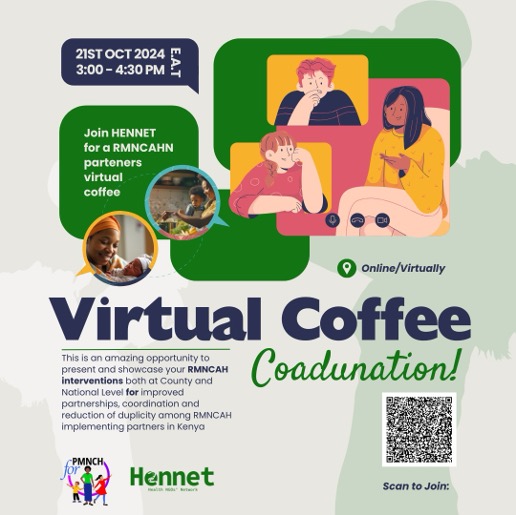
While Kenya has made gradual progress in improving women’s, children’s, and adolescents’ health, urgent acceleration is required to end preventable maternal, newborn and child mortality, and heightened efforts are needed to address disparities between and within counties.
As noted in the Kenya Demographic Health Survey 2022, (KDHS, 2022) while 89% of deliveries are attended by a skilled birth attendant nationally, some counties report that less than 60% of women deliver with skilled birth attendants. Similarly, while the KDHS, 2022 reports a national adolescent pregnancy rate of 15%, in Samburu and West Pokot counties, 50% and 36% of teenagers between 15-19 years of age, respectively, have been pregnant. These disparities demonstrate the importance of strengthening county-led advocacy and collective, multi-constituency action.
Recognizing the critical importance of county-level advocacy, Health NGO Network (HENNET), as the Coordinating Partner for PMNCH’s Collaborative Advocacy Action Plan (CAAP) initiative, convened its inaugural quarterly ‘Virtual Coffee Coordination’ on October 21, 2024.
This virtual gathering brought together over 25 civil society and community-based organizations engaged in reproductive, maternal, newborn, child, and adolescent health (RMNCAH) advocacy and initiatives in many of Kenya’s 47 counties. As part of the CAAP initiative, the primary objective of the convening was to enhance coordination and collaboration while sharing best practices.
As shared by HENNET’s Sharon Musakali, “Today’s session offers partners a platform to discuss their ongoing RMNCAH priorities and activities. By sharing resources and highlighting best practices, we can strengthen our partnerships and enhance our community-driven advocacy efforts.”
Across all participating counties, there was a unanimous call for urgent action to address maternal and newborn mortality rates, as well as heightened advocacy focused on preventing stillbirths.
Partners came together in celebration, energized by the momentum generated by the September 2024 Siaya County RMNCAH Bill. In addressing alarming mortality rates and critical gaps in care, the bill aims to create a strong framework for delivering essential RMNCAH services. This legislation not only reflects the steadfast political will of Siaya County officials but also highlights the power of collaboration among county health departments, civil society organizations, and the community. Partners expressed their support for advancing similar legislation in other counties.
Participants shared valuable insights from their advocacy work in health system financing in Kakamega, Machakos, Mombassa, Siaya and Kisumu counties. Participants stressed the need to increase national and county health budgets in line with international commitments and to ensure that funds cover both service delivery and infrastructure to minimize gaps in RMNCAH service access. Frequent stockouts and high out-of-pocket costs for ambulance services, for example, highlight the need for consistent supply chains and budget transparency, especially for emergency and maternal care.
Ongoing budgetary activities include tracking domestic financing and budget absorption rates, hosting community forums to address barriers to absorption rates, implementing community scorecards to track RMNCAH investment, and providing policy recommendations to strengthen sexual reproductive health and family planning investments.
Strengthening adolescent and youth-responsive health systems and services was also a priority area partners are leading. Interventions in Kilifi County to domesticate youth-friendly services and ongoing campaigns leveraging community mobilizers to support adolescent girls’ uptake of health services, including family planning services and commodities, have shown positive results in increasing facility attendance and community engagement.
In Samburu County, one partner showcased an initiative aimed at enhancing the uptake of reproductive health services through engagement with community, religious, and traditional leaders. By facilitating dialogue with leaders and adopting a community-led approach, they have enabled shifts in social norms previously hindering access to family planning services. This approach has resulted in improved acceptability and uptake of health services while simultaneously supporting improved gender equity in the county.
The first Virtual Coffee Coordination provided a welcomed platform to bring together diverse civil society organizations supporting county-led efforts to deliver improved health and well-being for women, children, and adolescents.
Feedback received will be integrated into Kenya’s CAAP, an evidence-based, partner-led plan to support collaboration, accountability, and advance advocacy for women’s children’s and adolescent health and well-being in Kenya.

.png?sfvrsn=6d0e27cd_1)



